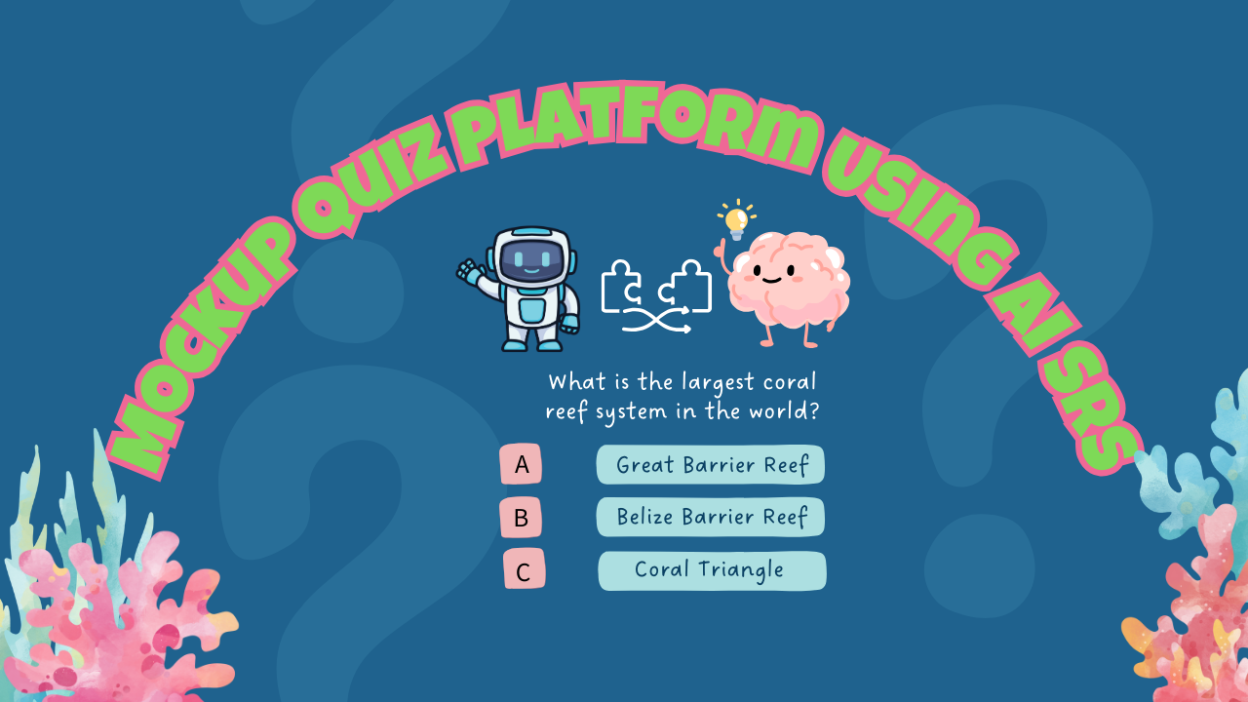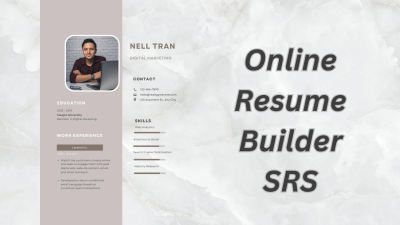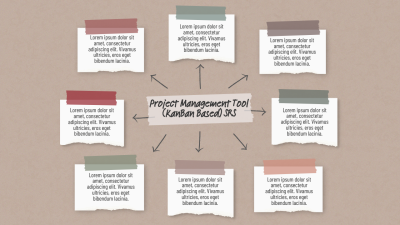Project Overview
Quizzes should be fun, smart, and actually useful. This AI-powered quiz platform builds quizzes that adapt to knowledge, challenge thinking, and push learning forward. No boring, static questions—AI creates dynamic quizzes based on interests, difficulty level, and performance.
The more quizzes taken, the smarter the system gets. AI analyzes answers, adjusts difficulty on the fly, and gives feedback to help improve. Educators can design custom quizzes, while casual users can explore topics they love. Personalization makes every quiz experience unique.
Built with React, Node.js, and powered by AI using TensorFlow and NLP, the system keeps things smooth and intelligent. MongoDB stores quiz data, while cloud deployment ensures scalability. Security keeps progress and scores private, with no messy data leaks.
Future updates bring voice-enabled quizzes, mobile support, and a gamified experience to keep motivation high. A quiz platform built for real learning, better engagement, and smarter testing—because knowledge should always feel exciting.
Introduction
Purpose
This project aims to develop a quiz platform that leverages AI technology to create dynamic quizzes. The system will generate questions based on user preferences and difficulty levels, provide feedback based on performance, and allow quiz creators to design quizzes.
Scope
- Users can take AI-generated quizzes tailored to their knowledge and interests.
- AI will adapt question difficulty based on the user’s performance.
- Users can review answers and get personalized feedback based on their results.
- Quiz creators can design quizzes with various topics and difficulty levels.
Target Audience
- Students and learners looking to test and improve their knowledge.
- Educators creating and managing quizzes for assessments.
- Casual users interested in quiz-based entertainment or self-improvement.
Definitions, Acronyms, and Abbreviations
- AI (Artificial Intelligence) – Technology that allows the system to simulate human intelligence to create personalized quizzes.
- NLP (Natural Language Processing) – A branch of AI that focuses on the interaction between computers and human language.
- ML (Machine Learning) – A method of AI where the system learns from user performance to improve quizzes over time.
- JSON – JavaScript Object Notation, used to store and manage quiz data.
System Features
User Registration and Authentication
- Users can sign up and log in using an email or social media accounts.
- Secure login with password recovery options.
- Profile management to track quizzes taken and performance over time.
AI-Generated Quizzes
- The platform will use AI to generate personalized quizzes based on the user’s preferences (subject, difficulty, etc.).
- The AI will adapt the quiz’s difficulty based on the user’s past performance (e.g., easier questions if the user struggles, harder questions if they perform well).
- NLP will be used to generate and interpret quiz questions dynamically.
Quiz Creation
- Users can create quizzes with custom questions.
- The system will allow text, multiple choice, and image-based questions.
- AI can suggest new questions based on the topic or difficulty level of the quiz.
- Quiz creators can set a time limit for each question or for the entire quiz.
Quiz Taking
- Users can take quizzes with a simple and interactive UI.
- Real-time scoring based on answers, with instant feedback after each question or at the end of the quiz.
- Adaptive Quiz Flow: AI adjusts subsequent questions based on the answers given.
Performance Analytics
- After completing a quiz, the platform will provide detailed feedback on the user’s performance.
- Visualized reports on areas of improvement.
- Personalized learning recommendations based on quiz performance.
Social and Sharing
- Users can share their quiz results on social media.
- Leaderboards and challenges to motivate users to compete with friends.
- Study Groups can be created, allowing users to take quizzes together and track group progress.
Admin Panel
- Admins can manage quizzes, users, and view overall statistics.
- AI models can be trained and improved through admin input.
Technology Stack
Frontend
- React.js or Vue.js for a dynamic, responsive user interface.
- HTML/CSS/JavaScript for basic structure and styling.
- Bootstrap/Material UI for UI components.
Backend
- Node.js (Express.js) for server-side development.
- Python (Flask/Django) for integrating AI and ML algorithms.
- GraphQL / REST API to handle data exchange between frontend and backend.
AI & Machine Learning
- TensorFlow.js or PyTorch for developing AI models.
- Natural Language Processing (NLP) for understanding and generating dynamic quiz questions (using libraries like spaCy or GPT models).
- Scikit-learn for building personalized machine learning models to adapt quizzes based on user performance.
Database
- MongoDB for storing quiz data, user profiles, and results (flexible document structure).
- PostgreSQL for relational data if required (e.g., managing user relationships, scores, etc.).
Hosting & Deployment
- AWS / Google Cloud for cloud hosting.
- Heroku / DigitalOcean for easy deployment and scaling.
- Docker for containerization of the application.
System Architecture
High-Level Overview
- Frontend: The interface that the user interacts with, allowing them to take quizzes, create quizzes, and view results.
- Backend: The server that manages user requests, stores data, and handles AI-generated quiz logic.
- AI Engine: The core engine that uses machine learning to generate and adapt quiz questions based on user input and performance.
- Database: Stores user profiles, quiz content, and performance data.
Flow of Data
- The user logs in and selects quiz preferences (subject, difficulty, etc.).
- The AI engine generates an initial quiz based on user data and preferences.
- The user answers the questions, and their performance is tracked in real-time.
- Based on the user’s answers, AI adjusts the difficulty or type of subsequent questions.
- The user completes the quiz and receives instant feedback on their performance.
- The system stores the performance data and provides personalized learning suggestions.
Implementation Guide
Development Environment Setup
- Install Node.js for backend development and React.js for frontend.
- Set up TensorFlow.js or PyTorch to implement AI features.
- Set up the database (MongoDB/PostgreSQL) and create schemas for quizzes, user profiles, and performance data.
Core Feature Development
- User Authentication – Implement registration and login functionalities with profile management.
- AI Quiz Generation – Integrate AI models that generate quizzes based on user input, preferences, and performance history.
- Quiz Creation & Customization – Allow users to create quizzes with custom questions and AI-generated suggestions.
- Performance Tracking and Feedback – Track user performance and provide personalized feedback.
Testing & Debugging
- Test the AI-generated questions to ensure they are relevant and appropriate for the user.
- Verify that quiz results are accurate and that feedback is given based on the correct metrics.
- Ensure that the system adapts questions correctly based on user performance.
Deployment
- Deploy the backend and front end on cloud platforms like AWS or Heroku.
- Use Docker for containerization to ensure smooth deployment across environments.
Testing & Deployment
Functional Testing
- Test the ability to generate quizzes based on user preferences.
- Test the system’s ability to adapt quiz difficulty based on user performance.
Security Testing
- Ensure user data is secure and private.
- Test for potential vulnerabilities, especially in handling sensitive data like user profiles.
Deployment
- Deploy the system on the cloud and test scalability by simulating a large number of users taking quizzes simultaneously.
Future Enhancements
- Voice Integration: Allow users to take quizzes using voice commands, powered by NLP.
- Mobile Application: Create an iOS/Android version of the quiz platform for mobile users.
- Multilingual Support: Enable quizzes in multiple languages, leveraging AI for translation and language understanding.
- Gamification: Add points, badges, and achievements to motivate users to take more quizzes.
Conclusion
Learning should feel like a challenge, never a chore. AI makes quizzes smarter, adapting to strengths and filling in the gaps. Generic questions disappear, making every attempt feel meaningful. The more it’s used, the better it gets, turning every quiz into a personalized learning journey. With future updates, it only gets more exciting. Smart, fun, and built to keep curiosity alive.



